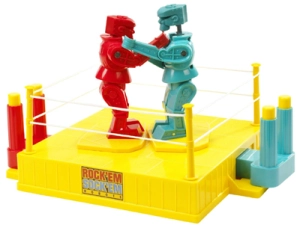Competition vs. Collaboration in Game-Based Learning
Game /gām/ (noun) A form of play or sport, especially a competitive one played according to rules and decided by skill, strength, or luck. (Oxford English Dictionary)
Can Competition and Collaboration Coexist in a Multiplayer Learning Game?
COMPETITION
Games are, by definition, competitive, whether you’re competing against yourself, other players, the game itself, or some combination of these.

Competition in game-based learning (GBL) is beneficial because:
- Competition motivates players, leading to higher engagement levels
- Competition encourages teammates to motivate each other
- Losing a game can lead to greater learning as long as it leads to more reflection and critical thinking instead of disillusionment
- Players can learn good sportsmanship skills from winning and losing.
However, in today’s educational world, competition might not be good for students because:
- Competition can increase hostility between students
- Competition weakens the intrinsic motivation to learn the educational content because of the focus on winning
- Losing can lead to lower self-esteem.
To learn more about using competition in education, please read this excellent online resource.
COLLABORATION
On the other hand, collaboration is considered a good skill for students to learn.

Some of the benefits of collaboration include:
- Teaches teamwork and other social skills
- Gives a greater sense of purpose by being part of something bigger
- Provides motivation to help your group succeed
- Prepares students for real-life collaborative work.
In multiplayer games, such as World of Warcraft, collaboration is essential to succeed in various game tasks. New social games, such as The Sims Social, highlight collaboration among players as essential game features. Even in a single player game, collaboration is beneficial when another person is watching and giving advice about, say, how to catapult the next angry bird.
However, too much emphasis on collaboration could possibly detract from the fun of the game (see example below).
COMPETITION AND COLLABORATION IN A MULTIPLAYER LEARNING GAME
Most of the time, you would design a game to have enough competition to motivate but not so much to detract from learning collaborative skills. If you put too much emphasis on competition, the focus goes on winning and not on helping others. On the other hand, if you put too much emphasis on collaboration, you run the risk of turning a fun, motivating game into a boring group school assignment.
For example, say there is a three-person team robotics game where each team has an hour to make its robot do something. If the emphasis is on competition (winning), it’s likely that one person does everything and no collaboration takes place. But, if the main emphasis is on collaboration, such as having the rules state that every person must be assigned to one of three tasks, then the game may start to feel like more of a group work assignment than a competitive game.
Ideally though, you should strive to design games that use competition to improve collaborative skills:
- In basketball players, the desire to win forces players to collaborate better to play as a team
- In charades, in order to win, partners have to learn to collaborate better to understand each person’s non-verbal communication patterns
- In the videogame Rockband, competition spurs on better collaboration in order to get a higher score.
So, when you are designing or evaluating a multiplayer learning game, make sure you take some time to reflect on the balance and interdependency of the competitive and collaborative elements in the game. These elements could very well be the key to the game’s ability to engage AND educate its players.
Do you know the studies of Fengfeng Ke? Several with the competitive vs collaborative vs individualistic condition.
Jantina Huizenga
September 27, 2011 at 1:34 pm
Hi Jantina – no I haven’t heard of Fengfeng Ke, but I did Google her and found this interesting study: http://dl.acm.org/citation.cfm?id=1150080&dl=ACM&coll=DL&CFID=45025356&CFTOKEN=51736546, which found that “Results indicated that gaming in cooperative goal structure was most effective in promoting positive math attitudes.”
Thanks for your comment!
randyfuj
September 27, 2011 at 3:23 pm
Hi,
Here are some more on the conditions, some very similar, but still different studies.
*Ke, F. (2008). Alternative goal structures for computer game-based learning. International Journal of Computer-Supported Collaborative Learning, 3(4), 429-445. doi: 10.1007/s11412-008-9048-2.
*Ke, F. (2008). Computer games application within alternative classroom goal structures: cognitive, metacognitive, and affective evaluation. Educational Technology Research and Development, 56 (5/6), 539-556.
*Ke, F., & Grabowski, B. (2007). Gameplaying for maths learning: Cooperative or not? British Journal of Educational Technology, 38(2), 249-259.
I’m currently editing my review of a decade of DGBL research, so that’s how I know.
Some other interesting studies (but just DGBL, not the conditions) of Ke are:
A case study of computer gaming for math: Engaged learning from gameplay?
A Qualitative Meta-Analysis of Computer Games as Learning Tools
Another study explicitly mentioning competition is one of Van Eck: CONTEXTUAL PEDAGOGICAL ADVISEMENT AND COMPETITION ON ATTITUDE TOWARD MATHEMATICS
I remember only one other study explicitly mentioning something about the competion, but that one is in Dutch, so not very helpful I guess 🙂
Jantina Huizenga
September 27, 2011 at 3:57 pm
Thank you for the additional references. What is your personal opinion about balancing competition with collaboration in GBL?
randyfuj
September 28, 2011 at 9:52 am
I noticed students like to collaborate and I also think it’s a good idea for them, that potentially they can learn more together than alone. I also noticed in games competition made them work hard/motivated, so I like them working in teams competing against other teams. Though keeping the balance is still a difficult issue. If competition is working too well in some games the learning gets lost (because of skipping important information or relying on guessing quickly in order to earn points as quick as possible), but I think good games adress those issues and competition doesn’t have to be a problem. So, a very nuanced answer, but I’m just not a black or white kind of a person….
Jantina Huizenga
September 29, 2011 at 4:35 am
Thanks for your excellent response! Yes, I too think that teams competing against other teams is a good way to balance competition and collaboration. The role of the teacher/instructor thus becomes very important because he/she has to constantly monitor this balance in order to keep the students motivated while still making sure they are collaborating and learning. This is one more reason that the “games can replace teachers” idea does not make sense.
randyfuj
September 29, 2011 at 10:12 am
I love this post. Everything is so true. I really hope we can encourage game developers to create games that are very educational, combining fun and learning is really a great idea. I have kids and since they love playing games in the internet and other gadgets, I always look for games that has benefits, the ones they can enjoy and make them love learning.
Games For My Website
October 2, 2011 at 11:08 pm